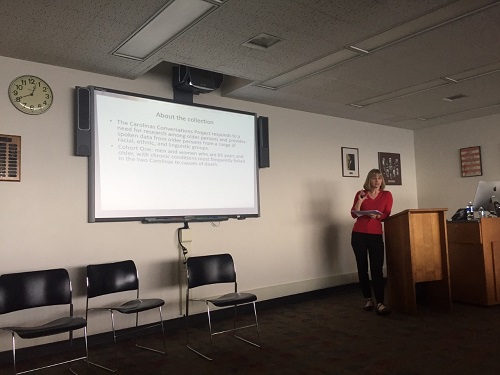Potter College News
Dr. Trini Stickle Accepted into CASHA Program
- Kristen Darby and Madeline Kinser
- Thursday, August 22nd, 2019

WKU English Department faculty member Dr. Trini Stickle was recently accepted to the WKU Center for Applied Science in Health and Aging (CASHA). The CASHA program conducts broad and detailed research on the process of aging. This includes studies into subjects such as health issues, social issues, and lifestyle issues that occur as we get older, such as dementia or loneliness. The program focuses on how these issues affect the health and wellbeing of those participating in the study, and the findings of their research will go toward improving these issues to better the aging experience.
Dr. Stickle applied for a CASHA membership because the group’s research is related to her linguistic research. As an applied linguist, Dr. Stickle studies the interactional competency of those living with dementia and autism. Currently, Dr. Stickle is working on two projects. One project is a collection of social interactional research on the dementia experience for clinicians, caregivers, family members, and other researchers called Learning from the Talk of Persons with Dementia: A Practical Guide to Interaction and Interactional Research. Dr. Stickle is also the editor of the aging section of The Palgrave Encyclopedia of Critical Perspectives on Mental Health.
“Editing the collection and writing my own chapters for that work made me realize how much fellow researchers need to be in conversation with each other to produce good work,” says Dr. Stickle. “We need that dialogue, those other perspectives, to help uncover our assumptions and biases, to stimulate ideas as we design research and interpret our findings.”
Dr. Stickle believes that it is absolutely essential for a researcher to have colleagues with whom they can discuss ideas, projects, and findings. That is part of what makes being a part of CASHA so beneficial. Although there is an emphasis in applied science and health, Dr. Stickle hopes she will be able to provide other members of CASHA with helpful perspectives on research strategies and communication due to her linguistic training and experience.
“CASHA is open to diverse approaches,” says Dr. Stickle. “As an applied linguist, I feel my education from its roots in humanities, particularly beginning with the study of literature to my linguistic training in such things as syntactic analysis or acoustic phonetics – the measuring and mapping of language sounds – situates me in a very interesting position when looking at aging issues.”
Dr. Rob Hale, Head of English at WKU, added, “Many people would be surprised at how well English and linguistic studies complement work in science fields. Dr. Stickle is a great example of a scholar who builds bridges across disciplines, bridges that make research more meaningful and impactful.”
For any faculty interested in joining CASHA, Dr. Stickle has some advice:
“Core to being a member is that your research interests are in the aging experience. Second to that, I think one has to be willing to apply the narrow training we each have – as our doctoral training has so narrowly focused us – and be willing to step outside that narrow training to entertain other perspectives, research agendas, and approaches to the human condition.”
For more information about CASHA, please contact Dr. Stickle.
Some of the links on this page may require additional software to view.

